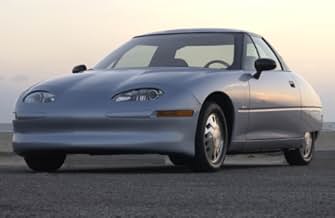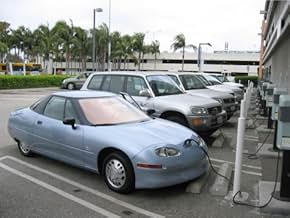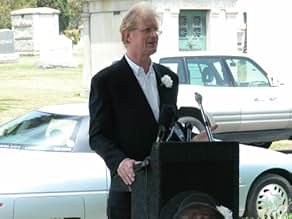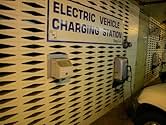CALIFICACIÓN DE IMDb
7.6/10
13 k
TU CALIFICACIÓN
Un documental que investiga el nacimiento y la muerte del coche eléctrico, así como el papel de las energías renovables y la vida sostenible en el futuro.Un documental que investiga el nacimiento y la muerte del coche eléctrico, así como el papel de las energías renovables y la vida sostenible en el futuro.Un documental que investiga el nacimiento y la muerte del coche eléctrico, así como el papel de las energías renovables y la vida sostenible en el futuro.
- Dirección
- Guionista
- Elenco
- Premios
- 4 nominaciones en total
Martin Sheen
- Narrator
- (voz)
Reverend Gadget
- Self
- (as Greg 'Gadget' Abbott)
David Freeman
- Self
- (as S. David Freeman)
Frank Gaffney
- Self
- (as Frank J. Gaffney Jr.)
- Dirección
- Guionista
- Todo el elenco y el equipo
- Producción, taquilla y más en IMDbPro
Opiniones destacadas
I'm neither a liberal or a conservative (yes, there are other options!)and while I expected to read the usual 'party lines' concerning the politics of this movie ... I was AMAZED at how many people missed the point of the movie. This wasn't, at its heart, a movie about the politics of energy. Rather, it was a human story about people who found, and even fell in love, with a preferred form of transportation, only to have it taken away from them against their will. ***CAUTION --- POSSIBLE SPOILERS AHEAD*** I don't think what I'm about to say will spoil the movie experience, but I decided to play it safe. The most amazing part of the story, to me, concerns the quiet battle between General Motors and the EV1 lessees who wanted desperately to keep their vehicles. Why did GM take such a hard core approach? It seemed to me a more conciliatory approach would have done the embattled auto-maker a world of good. To me, that was the question that drove the story. Yes, most of the people who apparently leased one of GM's electric cars were celebrities and/or people of some measure of wealth. So what? Anyone who likes electronic gadgetry has heard the expression "early adopter," referring to those with money who purchase state-of-the-art equipment at high prices, thereby fueling the development and investment that pushes products to consumer-level pricing. GM's inability to realize this is what makes the whole story fascinating. I encourage anyone who would, to watch the movie closely, and see If this doesn't ring true. Now, having said my piece about the movie, let me throw some comments about energy policy into the fray. 1) We absolutely, positively need gas to reach a price of $5 a gallon or more. Why? Supply and demand. Only when it HURTS to drive a gas guzzler, will most of us finally get off that doomed bandwagon. 2) We had a solution to coal produced electricity in our laps twenty years ago, and a piece of Hollywood drivel ("The China Syndrome")turned us into weenies. Yes, folks, I mean nuclear power. It CAN and IS producing power safely, and environmentally soundly. Just not here in the U.S., by and large. Finally, 3) Supporting the development of electric-only cars is a viable choice. With the improvements being made in solar panel technology, I suspect a working battery-solar hybrid may be a very real option in the NEAR future. If we avoid the stupidity this movie helps us to understand.
I think this movie is wonderful. Can't understand the low rating on this site so far--I really wouldn't be surprised if those individuals and industries who stand to lose profits from the revelations of the movie, have voted negatively to artificially reduce its average rating on this well-known site. I mean, jeez, the movie hasn't even debuted yet (I saw an advanced screening)! And already it's only at a four-something? C'mon! Since I leased and drove an EV daily for three years(until it was rear-ended), I feel I'm in a good position to realistically evaluate the movie. Let's face it, it's a story that needs to be told. These issues impact everyone, since everyone is affected by air quality, unstable foreign politics, gas prices, transportation, and (lack of) consumer choice. EV technology is here, now. Unlike the fuel cell, which is perpetually 10 years in the future. Why was it taken away from the consumers who wanted it? Why does our society not promote the mentality that multiple solutions (EVs, fuel cells, hybrids, bicycles, mass transit, increased fuel economy, etc. etc.) all need to be employed to attack our problems with pollution and dependence on foreign oil? Why are there all these myths that the electric car is undesirable and not viable? Consumers and policy makers need to know this story.
As a driver who lived and followed the story, I think the movie does a bang-up job of revealing it. The movie begins with a historical look at the development of the electric car, what factors discouraged it back then, what brought it back to life in the 1990's, its amazing features, and why it is no longer available to consumers as a production vehicle. (conversion kits only, folks!) The movie is filled with history, politics, technology, innovation, and some very interesting personalities. It's woven together well and is smooth and fascinating. Even though it's a documentary, it will not put you to sleep! Go on--go see it. Even if you don't agree with it, you won't regret it. We all have a responsibility to be more active with these issues, and in the meantime it's a fascinating story.
As a driver who lived and followed the story, I think the movie does a bang-up job of revealing it. The movie begins with a historical look at the development of the electric car, what factors discouraged it back then, what brought it back to life in the 1990's, its amazing features, and why it is no longer available to consumers as a production vehicle. (conversion kits only, folks!) The movie is filled with history, politics, technology, innovation, and some very interesting personalities. It's woven together well and is smooth and fascinating. Even though it's a documentary, it will not put you to sleep! Go on--go see it. Even if you don't agree with it, you won't regret it. We all have a responsibility to be more active with these issues, and in the meantime it's a fascinating story.
As a former engineer with both GM and Ford, I have to thoroughly refute what a previous commenter has stated about likely explanations. With the technology of the powertrain/fuel source development that far along, that far advanced within a viable vehicle, crash-safety and equipment regulations would not have removed this from the marketplace. The "skin" and tub/framework of the vehicle would have been either reworked to comply or the powertrain/fuel source would have been adapted to fit existing car lines that meet crash-safety and equipment regulations. There are plenty of examples of "hurry up" retro-fits in Detroit/Dearborn's history. Unfortunately there is much documented history of technology being quashed, patents being bought and buried, innovations left by the wayside to discourage change, discourage having to retool, reinvent, reinvest...and if you don't think that auto/oil/gov are all complicit in this, how naive can one be? GM and the railroads, the Tucker, fuel injection, Wankel engine, anti-lock brakes...all quashed by powerful companies and people not wanting change no matter what the benefit would be in safety, society, or the environment.
10lise-36
Director Chris Paine is no dummy. As a onetime owner of an electric car (the EV1) and a savvy filmmaker, he has quadruple checked his factsand they are alarming. Although the electric car obviously depends upon coal or oil for its power, electricity is far cleaner than gasoline in the long run with less carbon output. Additionally, the batteries are recyclable, and electric cars make fewer demands in other environmental ways: There are no oil changes, oil filters, spark plugs and other parts and services that conventional autos require. Each of these parts carries its own environmental cost.
See this film. It has nothing to do with the current price of gas and everything to do with corruption on many levels.
See this film. It has nothing to do with the current price of gas and everything to do with corruption on many levels.
This movie really highlights problems with American business. It seems that even after killing the electric car, there is actually a concerted effort afoot to kill the electric car movie. I can see that someone might not give it a 10 but a 2? Come on, its a great movie. Someone appears to be lowballing the vote. How anyone can build a love story and turn it into a tragedy -- about a car is amazing but unfortunately believable. I don't believe in conspiracy theories but I guess here it is just a strongly for or strongly against issue so it really isn't a conspiracy. However, I see the misinformation brigade that the movie caught in its own lies is at it even here at IMDb. Can you imagine a car company recalling all its cars, crushing them and killing the entire line just because a safety standard changed? Come on, whoever wrote that, please tell us what wavers were made? That explanation just doesn't make sense. A little more engineering and any problems (if there are any) can be solved. I highly recommend that anyone who drives, breathes, or hates to buy gas should see this movie.
¿Sabías que…?
- TriviaThe boxy, small EV shown being crushed in the movie was the Honda EV-Plus. They, like the sleek GM EV-1, were only available for lease; several returned to Honda, and were converted into fuel cell demonstration vehicles. For a while, you were able to lease them through EV Rentals (at several Budget Rent a Car locations).
- Citas
Mel Gibson: Who writes the history? Um, well... The guy with the biggest club.
- Bandas sonorasJane's Theme
from El piso 13 (1999) (as The 13th Floor)
Composed by Harald Kloser
Courtesy of Centropolis Entertainment
Selecciones populares
Inicia sesión para calificar y agrega a la lista de videos para obtener recomendaciones personalizadas
- How long is Who Killed the Electric Car??Con tecnología de Alexa
Detalles
- Fecha de lanzamiento
- País de origen
- Sitio oficial
- Idioma
- También se conoce como
- EV Confidential
- Locaciones de filmación
- Productoras
- Ver más créditos de la compañía en IMDbPro
Taquilla
- Presupuesto
- USD 1,000,000 (estimado)
- Total en EE. UU. y Canadá
- USD 1,678,874
- Fin de semana de estreno en EE. UU. y Canadá
- USD 45,138
- 2 jul 2006
- Total a nivel mundial
- USD 1,764,304
- Tiempo de ejecución
- 1h 32min(92 min)
- Color
- Mezcla de sonido
- Relación de aspecto
- 1.75 : 1
Contribuir a esta página
Sugiere una edición o agrega el contenido que falta



























